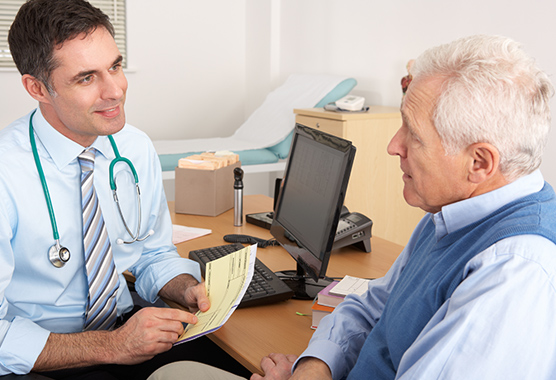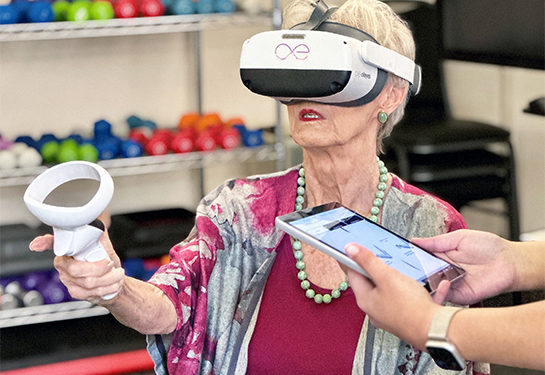Movement Disorders and Neurorestoration
People with movement disorders receive compassionate, specialized care at our Movement Disorders Program. We offer the latest diagnostic tests, advanced treatments and access to clinical trials.
Medically reviewed by Lin Zhang, M.D. on May 01, 2024.

What Are Movement Disorders?
Movement disorders are neurological conditions that affect your ability to make and control movements. You may have involuntary (uncontrolled) movements, such as tremors or jerking motions.
Some people have difficulties with voluntary movements, resulting in slowness, rigidity (stiffness) or impaired coordination. These conditions can negatively impact your ability to get around, work and enjoy life.
Types of Movement Disorders
At the UC Davis Movement Disorders Program, our neurologists (nerve disorder specialists) provide the highest level of care.
We perform advanced testing and offer comprehensive treatments for all types of movement disorders, including:
- Ataxia: Poor muscle control that causes clumsy movements.
- Dystonia: Involuntary, sometimes painful muscle spasms that affect the body.
- Essential tremor: Uncontrollable shaking in your hands, arms or other body parts.
- Huntington’s disease: Inherited disorder that affects your movements, thoughts and behaviors.
- Parkinson’s disease: Loss of muscle control that leads to slowed movements, balance issues and tremors.
Movement Disorder Symptoms
Symptoms vary depending on the type of movement disorder. These symptoms can be mild or severe.
Common Symptoms
Signs of a movement disorder include:
- Balance and coordination problems
- Changes to how you walk, including difficulty walking
- Limb or trunk stiffness
- Problems swallowing or speaking
- Uncontrolled movements, such as jerks, twitches, tremors or spasms
Movement Disorder Causes and Risk Factors
Several factors can cause movement disorders. Nerve cell (neuron) damage or death to areas of your brain can affect how your body moves. Some people have gene changes that affect the brain.
Gene changes (mutations) cause some types of movement disorders. You may inherit this gene change from a parent, or the gene may mutate spontaneously.
Several factors may increase your risk of developing a movement disorder:
Age
Many movement disorders become more common as you get older.
Brain Damage
A traumatic brain injury (TBI) increases your risk.
Infections
Infectious diseases, such as bacterial meningitis, can cause brain swelling that leads to a movement disorder.
Lifestyle Behaviors
Behaviors, such as using tobacco or excessive alcohol use, may increase risk.
Metabolic Disorders
Metabolic disorders can cause toxins to build up in your body, leading to nerve or brain damage.
Stroke
Having a stroke or vascular disease that affects blood flow to your brain may raise your risk.
Toxins
Exposure to certain toxins, such as manganese, iron, carbon dioxide and carbon disulfide, puts you at risk.
Diagnosing Movement Disorders
Many movement disorders share similar symptoms and mimic other conditions. An accurate diagnosis is key to effective treatment.
Our movement disorder specialists have expertise in diagnosing common and rare movement disorders. We start with an in-depth neurological exam to test your muscle strength and reflexes.
Depending on your symptoms, you may get one or more of these tests to aid diagnosis and rule out other conditions:
- Blood test: This test can diagnose certain movement disorders and rule out others.
- Electroencephalogram (EEG): An EEG assesses your brain’s electrical activity.
- Electromyography (EMG): An EMG evaluates how well your muscles and nerves work together.
- Muscle biopsy: Your provider removes a small sample of muscle tissue to check for signs of disease.
- Nerve conduction study: A nerve conduction study measures how fast electrical impulses travel through nerves to reach muscles.
- Neuroimaging: Medical imaging tests, such as MRIs and positron emission tomography (PET) scans, can show changes in your brain.
- Skin biopsy: Your provider removes a small sample of skin tissue to check for signs of disease.
- Spinal tap (lumbar puncture): Your provider uses a needle to remove a small amount of spinal cord fluid. A lab expert examines the fluid for signs of disease.
Movement Disorder Treatments
Your provider will customize a treatment plan based on the disease type and severity of symptoms.
Medications
You may benefit from muscle relaxants, botulinum toxin injections, and specialized medications for movement disorders. Medication effectiveness can vary from person to person. Our team may use a combination of drugs or adjust dosages to find the best treatment approach.
Physical, Occupational and Speech Therapy
Physical therapy and occupational therapy can ease muscle stiffness and pain, improving mobility and quality of life. Speech therapy can help with speech and swallowing issues.
Deep Brain Stimulation (DBS)
A surgically implanted device sends mild electrical currents to your brain to reduce involuntary movements.
Clinical Trials
We’re active in the latest movement disorders research and clinical trials. You may benefit from promising new therapies that are still in development.
There are
40MAmericans who have some type of movement disorder
More than
30Different types of movement disorders exist
Source: International Neuromodulation Society: Movement Disorders
Request an Appointment
As Sacramento's No. 1 hospital, you'll benefit from unique advantages in primary care and specialty care. This includes prevention, diagnosis and treatment options from experts in 150 specialties.
Referring Physicians
To refer a patient, submit an electronic referral form or call.
800-4-UCDAVIS
Patients
Call to make an appointment.
Consumer Resource Center
800-2-UCDAVIS

Ranked among the nation’s best hospitals
A U.S. News & World Report best hospital in cardiology, heart & vascular surgery, diabetes & endocrinology, ENT, geriatrics, neurology & neurosurgery, and pulmonology & lung surgery.

Ranked among the nation’s best children’s hospitals
U.S. News & World Report ranked UC Davis Children’s Hospital among the best in pediatric nephrology, orthopedics*, and pulmonology & lung surgery. (*Together with Shriners Children’s Northern California)

Ranked Sacramento’s #1 hospital
Ranked Sacramento’s #1 hospital by U.S. News, and high-performing in aortic valve surgery, back surgery (spinal fusion), COPD, colon cancer surgery, diabetes, gynecological cancer surgery, heart arrhythmia, heart failure, kidney failure, leukemia, lymphoma & myeloma, lung cancer surgery, pacemaker implantation, pneumonia, prostate cancer surgery, stroke, TAVR, cancer, orthopedics, gastroenterology & GI surgery, and urology.

The nation’s highest nursing honor
UC Davis Medical Center has received Magnet® recognition, the nation’s highest honor for nursing excellence.

World-class cancer care
One of ~59 U.S. cancer centers designated “comprehensive” by the National Cancer Institute.

A leader in health care equality
For the 13th consecutive year, UC Davis Medical Center has been recognized as an LGBTQ+ Healthcare Equality Leader by the educational arm of America’s largest civil rights organization.

